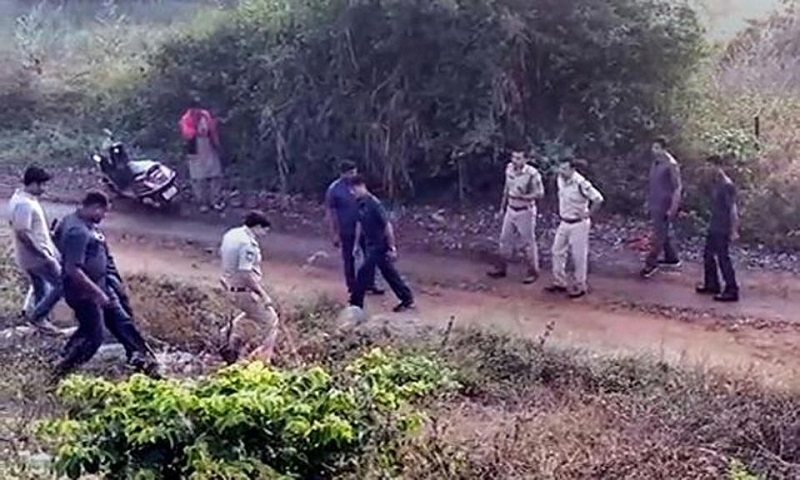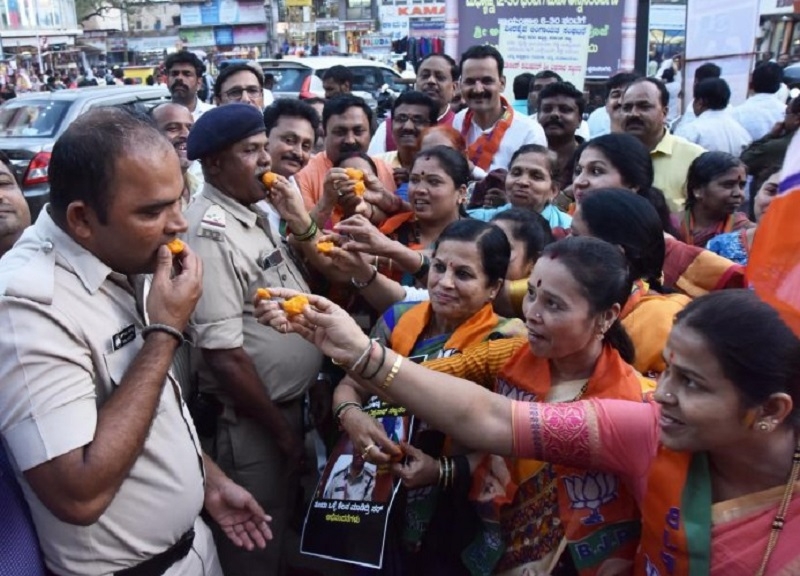Collapse of Four Pillars of the Constitution

Judiciary and Police are facing the public ire following the rape, strangulating and burning the body of Dr. Priyanka Reddy in Hyderabad area and the Unnao rape victim succumbing to 90% burns when she was waylaid by the accused released on bail and dousing her with petrol and burning her.
The barbaric and heinous crime perpetrated by the four in Hyderabad and the five in the Unnao are cases among many others happening on daily basis and does not deserve any justification whatsoever by human rights activists in the name of liberal and civilized values. Such persons must first appreciate the horrendous play of cruelty inflicted on their innocent victims and empathize with not only the families but also all those emotionally and sentimentally reacting to the follow up events. Why are they not crying foul about the victim’s human rights?
Coverage of rape news, particularly gang rapes, followed by murders and rapes of minor continue to be reported in news media. Politicization gets prime visual media coverage. And, the virus spreads on social media network. However, the same cannot be said to be true in the case of religious heads.
Due processes of laws are meant for civilized persons; but certainly not for brutal barbarians on the prowl exploiting loopholes or shortcomings in the law and order machinery/criminal justice system. For God’s and women’s sake, let not anyone view rapes as aberrations in a civilized society.
In sum, there is almost universal acknowledgment that all the four pillars of the Constitution – Executive, Legislature, Judiciary and Media – are suffering from systemic collapse. Their collapse was not a sudden one; but cumulatively piled up over the past 70-years. Of course, the blame first falls squarely on the political leadership followed by the judiciary and the media. Punching bags are the police forces.
Now none other than President Kovind has publicly expressed his anguish at the phenomenal delays and suggested review of the concept of “Mercy Petitions”, as the Head of the Executive, the ball is now in the court of the legislature and the judiciary to reform/refine the system.
Ipso facto, it must be accepted that the criminal justice system has virtually collapsed. If the criminal justice system has collapsed, who are responsible for it? Surely, incompetence of the legislature gets exposed for their utter failure to prescribe laws that can deter or minimize such brutal acts.
Be that as it may, existing laws and the judicial processes are least effective in delivering speedy justice. Good to pontificate by the present Chief Justice of India (CJI) that “Justice can never be instant”. Recognize the CJI Systemic that “Justice delayed (phenomenally) is also Justice denied to the victims”.
Atrophy afflicts Judiciary. Conviction rates in rape case have fallen from 44.3% in 1973 to around 25% today. Phenomenal delays are the rule; but not exception. Even in the media high-voltage Nirbhaya rape case, the accused ably supported by their lawyers are delaying the execution of punishment of death by hanging. It clearly illustrates the conceptual flaws in the due processes of laws. No wonder, people’s sentiments and emotions are craving for retributive instant justice – lawlessness - instead of the most farcical due processes of law even in the case of barbaric criminals.
Next, the views expressed by elected representatives in the Parliament and State Assemblies clearly expose the farce of current laws. No wonder, Jaya Bachhan wants “lynching” of rapists. BJP MP and former minister Rajyavardhan Rathore called it the “victory of good over evil”. BSP chief Mayawati exhorted other state police departments to take inspiration from the Telangana cops. Congress leader Abhishek Manu Singhvi, a lawyer tweeted a high-five emoji.
In retrospect, law makers over the past 70-years are squarely responsible for the present inadequacies and shortcoming in laws. The present lawlessness is the fallout of the failure of legislature.
Lawmakers must realize that India is not a ‘civilized society’. They too must accept their fair share of responsibility and accountability for breeding lawlessness. And, they cannot lay claims to be paragons of virtue, decency and decorum. The ruckus and the unruly behavior of two Congress Party MPs inside the temple of democracy – Parliament – charging at Smriti Irani, a Minister, clearly highlights the malice of lawlessness spreading like a virus in the society.
Let me reiterate that modern India is “diseased civilization”. The premise of a “civilized society” is most farcical. Recognize all alike that there are many layers of civilization – stone-age to space age. For example, Sentinelese tribal people living in splendid isolation living – reclusive - on the North Sentinel Islands; tribal people living in remote and inaccessible mountains; rural tribal communities living in isolation in forests; rural village hamlet; urban slums like Dharavi in Mumbai (10 lakhs living in 0.81 sq. miles) what with population density of 717,780/sq mi; towns, cities and mega cities.
Thus, a universal law for the many layers of civilization is conceptually impossible. It is never too late than never for lawmakers ably assisted by bureaucrats and judiciary to identify, formulate and define laws meant to deter erring individuals from committing horrendous crimes.
Nowadays, media trail and sensational news cast in the name of freedom of the press is routine. Media houses and anchors, opinion makers and builders, are divided in their responses. If some among them are hailing the action of the Hyderabad Police, there are others who are accusing them as murderers. On one side media provokes police to act; and on the other side, the same media conducts media trail against the same police forces. Surely, the demonization of police forces by the media is grossly unfair. After all, they follow their political masters’ diktat. Yet, none in the media are baying for the blood of the political masters out of fear losing patronage.
In the ongoing media coverage, sensationalizing the gruesome murder of the victim is hardly ever covered. And, even the human rights activists have been silent on the issue of human rights of the victims. What about the right of victim? If the NHRC is fair then it must also conduct the gruesome violation of the diseased victim’s human right to live.
Media must avoid a parallel trail. The cacophony on debates does not lend to clarity on issues, choices and options to redress the current rot in governance. My question to media houses is simple. How many among them have formulated strategies to sensitized society on the issue of rapes.
At the same time, intellectuals, particularly human rights activists, claiming to repository of wisdom In the name of humanity, must carry out introspection of their own shortcomings in promoting, consolidating and advancing “sensitization” on heinous crimes like rapes as proactive and pre-emptive initiatives. How many among them are conducting programs among groups and vulnerable areas to “sensitize” society? Pontification from AC Rooms and before cameras is good pastime.
In sum, the virtual collapse of the four pillars of the Constitution is real. “We the People” have lost confidence in the system suffering from atrophy.
Some of the key issues that require introspection are simple. Is India a civilized society based on the rule of law? Can atrocities of rapes and murder of victim be prevented by a comprehensive policy of prevention and pre-emption? Are the laws appropriate, adequate and specific punishing the guilty through due process of law with utmost expedition? Can the current judicial procedures appropriately address the victims and their family concerns?

Ironic but true, that legal procedures in courts at all levels permit advocates for the prosecution or the defence seeking adjournments on flimsy grounds – 3-4 times at each step and that too extending over 2-3 months at each session. Naturally, delays in the disposal of trials have warped the judicial system. Never too late for the CJI to reform the legal procedures followed in the courts without resorting to commissions and committees which is time tested mechanism to hide incompetency.
Ipso facto, political interference/intervention – judiciary and police forces – does not allow them to operate autonomously and effectively. In the past, there have been instances when killing of accused has been carried out on orders of political masters.
Be that as it may, who is responsible for reforms/refinement of the judicial system – laws and processes? It is the function of government. And, the government must seek professional expertise both from the judiciary that includes the Judges and senior advocates and the police to redress the shortcoming in the system.
Reforms and refinements of the ‘criminal justice system” to ensure speedy justice in the case of rapes must include: structure of judiciary; categorization of rapes; changes in laws/procedures; specific time lines of delivery; and so on.
Is there a need for the current 4-level structure or can it be changed to 2-levels only? The concept of “Fast Tracks” is already in practice; but they too have failed to expeditiously deliver justice as their record proves. But, delays are also due to higher levels of courts – High court and Supreme Court.
So, if one is genuinely interested in speedy delivery of justice, 2-levels should suffice – Separate Trail courts under the Chief Judge of District Courts and an Appellate Court – High Courts - to confirm verdicts or reject or modify them. At the High Court also, bench/benches must be designated to deal with appeals depending on the numbers of rapes particularly large states. No need for yet another appeal at the Supreme Court. It would reduce work load of the Supreme Court. However, pseudo eminent lawyers would oppose such a reform for it would be at the cost of their high incomes.
Rightly so President Kovind’s has suggested that the mercy appeal process must be dispensed.
Admit everyone alike that there is a need to identify and define categorization of rapes as the first step so that laws are appropriately made to meet the ends of justice. One, gang rapes followed by murder of minors deserves to be a special category. Two, gang rapes followed by murder and burning to wipe out of traces of evidence also deserves to be yet another special category. Three, gang rape is yet another category per se. Four, individual rape and murder is yet another category. Finally, rape, per se, can be at the lower end of the category. Others too can be identified, if considered vital.
Laws must be appropriate to the chemistry of the criminals committing rapes and murders particularly, of minors. No mercy should be shown to such offenders. Non-bailable Arrest Warrants (NBWs) must be issued from arrest to the completion of trial and disposal of appeal is an imperative.
Furthermore, the judicial procedures require major changes. To expedite the delivery of justice, trail/fast courts and as well the Appellate Court must function on all Saturdays. Daily hearings without any interruption must be made imperative. Never ever give adjournments on account of any reason.
Finally, the Supreme Court direction to hide the identity of victims of rape and sexual assaults “even in a remote manner” is contestable. Relevant such a direction if the rape victim is surviving! But, why should there be a ban on revealing the name of a dead victim?
To sum up, the need for a “holistic overhaul” of the criminal justice system is a vital imperative. It must be done without further prevarication and procrastination by the legislature by the Parliament on day-to-day basis without indulging in the farce of referring to Parliamentary Standing Committees.
The CJI must change the norms of procedures followed in specially designated trail courts to enable time bound delivery of justice: work on Saturdays; no adjournments; and expeditious delivery of judgments.
